Nestled in the picturesque embrace of southwestern India, Kerala stands as an embodiment of enchanting beauty, vibrant culture, and timeless heritage. Revered as “God’s Own Country,” Kerala beckons travelers with its emerald landscapes, tranquil backwaters, and the warm embrace of its hospitality.
Yet, beyond its awe-inspiring natural splendors, Kerala unfolds a treasure trove of community-based ecotourism experiences that allow discerning travelers to immerse themselves in the very essence of this extraordinary region. As a passionate advocate for Kerala’s cultural tapestry, Moksha Stories invites you to embark on an exceptional journey that transcends the ordinary.
In this comprehensive guide, we shall unveil a kaleidoscope of lesser known community-based ecotourism activities that Kerala has meticulously preserved, offering you a profound understanding of the artisans, traditions, and crafts that define this unparalleled destination.
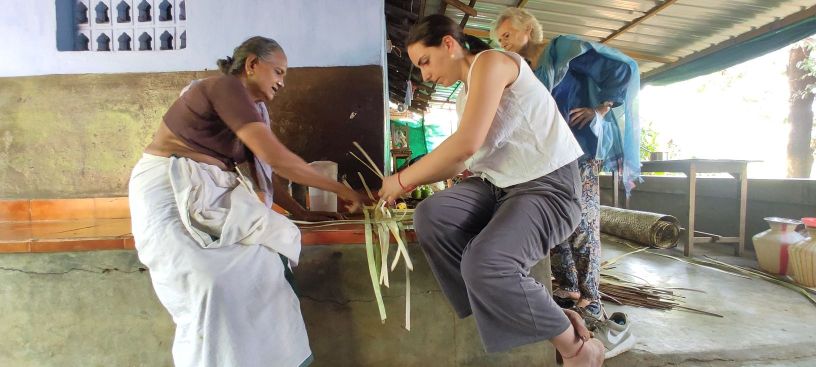
Handloom Weavers: Crafting Tradition
A sojourn into the heart of Kerala’s handloom weaving tradition promises an immersive ecotourism experience that will stir your senses and kindle your curiosity. Kerala’s rich tapestry of handloom heritage is woven deeply into its cultural fabric, with each weaving society weaving its own unique narrative through techniques honed and perfected across generations.
A prime example is the Balaramapuram weavers, where handloom enthusiasts can explore the exquisite Silk sarees and Mundus. These artisans take immense pride in preserving centuries-old techniques, and a visit to their loom is a mesmerizing journey through rich history, art, and culture.
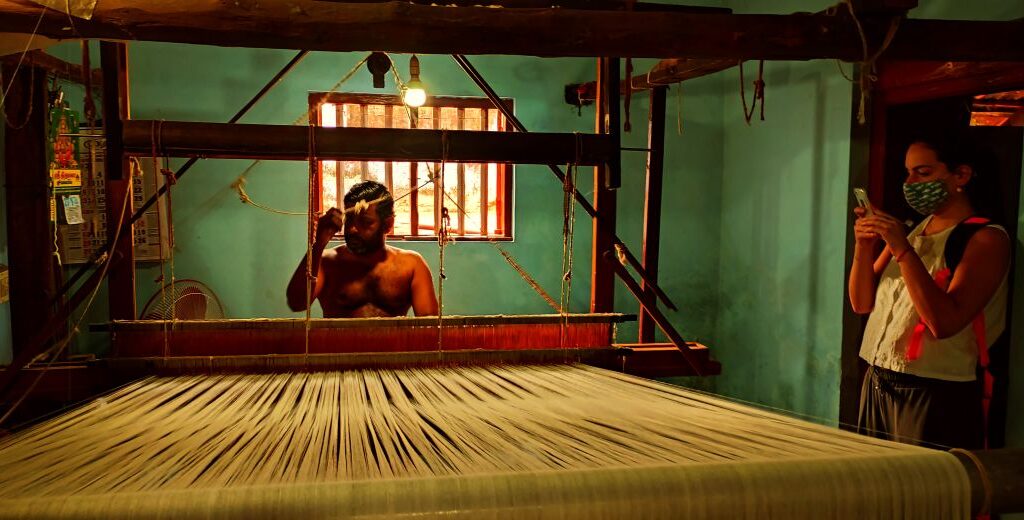
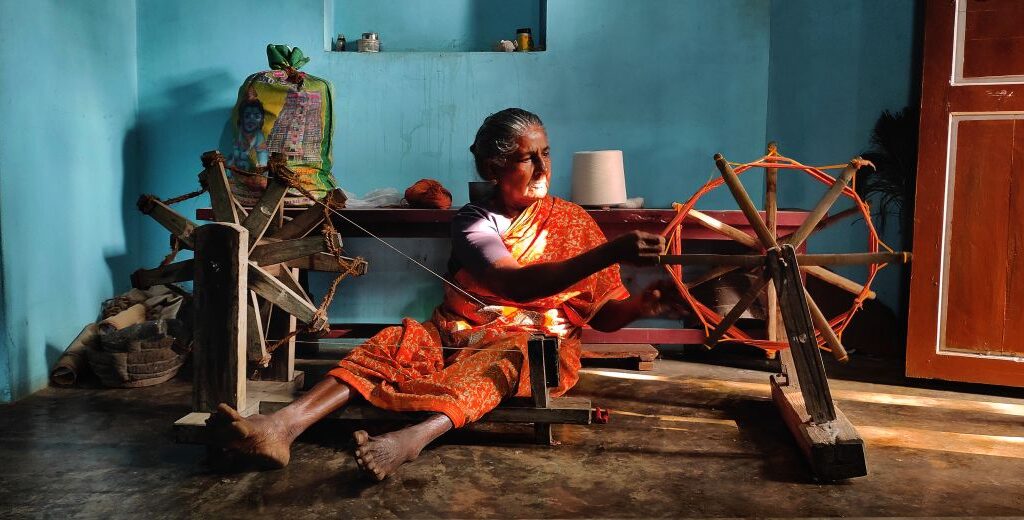
Further north in Kannur, the Chirackkal Weavers add their distinct chapter to Kerala’s weaving heritage, making it an ideal ecotourism destination. The intricate patterns and vivid hues of their creations narrate tales of tradition and craftsmanship passed down through the ages.
Meanwhile, the Kuthampully weavers, nestled along the banks of the river Nila, are celebrated for their Kasavu sarees and Mundus, providing travellers with an ecotourism opportunity to witness the painstaking process of crafting these elegant garments, where each thread is woven with precision and care.
However, the world of Kerala’s handloom weavers extends far beyond these exemplars. The state is adorned with weaving societies, each holding its own unique treasures for its travellers.
As you traverse these communities, you shall unearth the essence of Kerala’s textile heritage and cultivate a deep appreciation for the dedication and artistry of its weavers, a hallmark of Moksha Stories’ ecotourism offerings.
Bell-Metal Makers: Crafting Magic
Kerala’s bell-metal handicrafts are a visual symphony, a manifestation of the exceptional craftsmanship wielded by skilled artisans. The timeless beauty of Nilavilaku (wick lamps), Kindi (spouted pitchers), household utensils, and idols of deities from Hindu mythology comes alive in the skillful hands of these master craftsmen, providing an enchanting ecotourism experience.
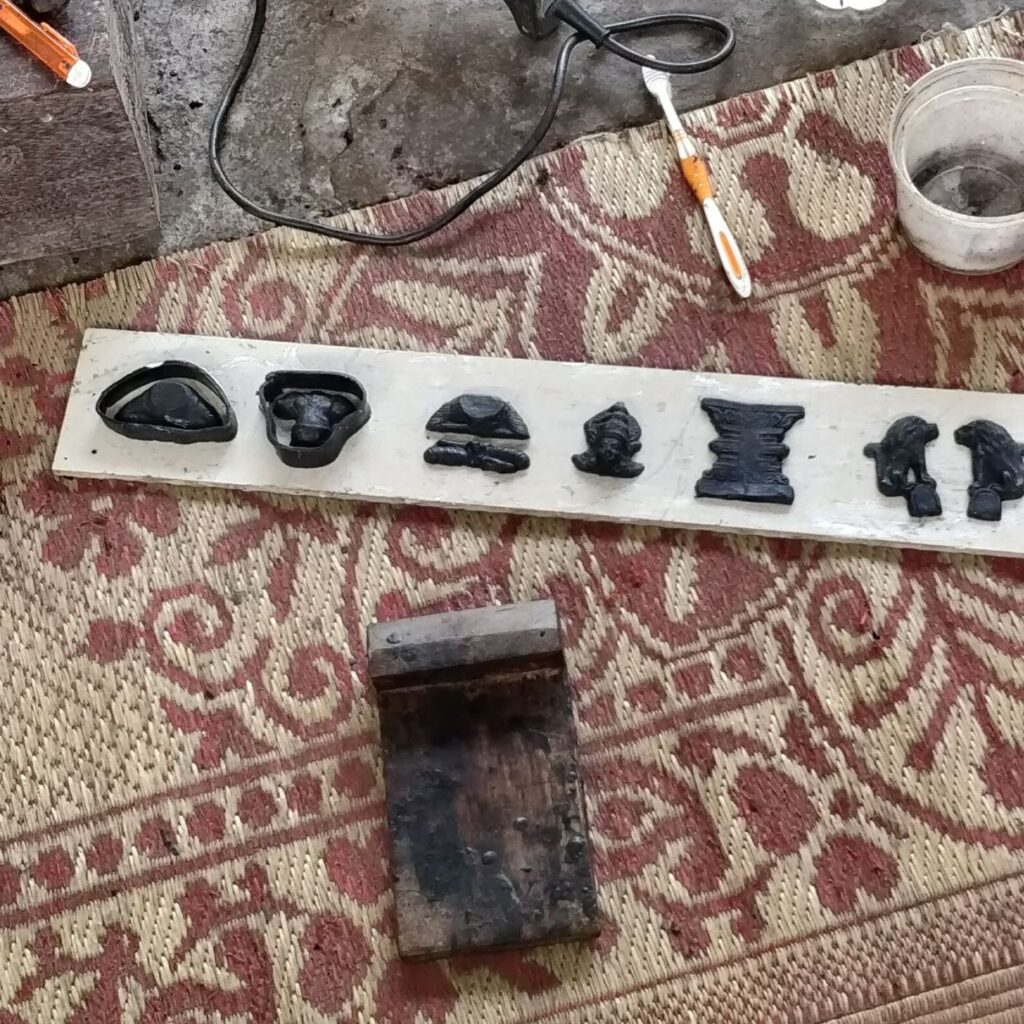
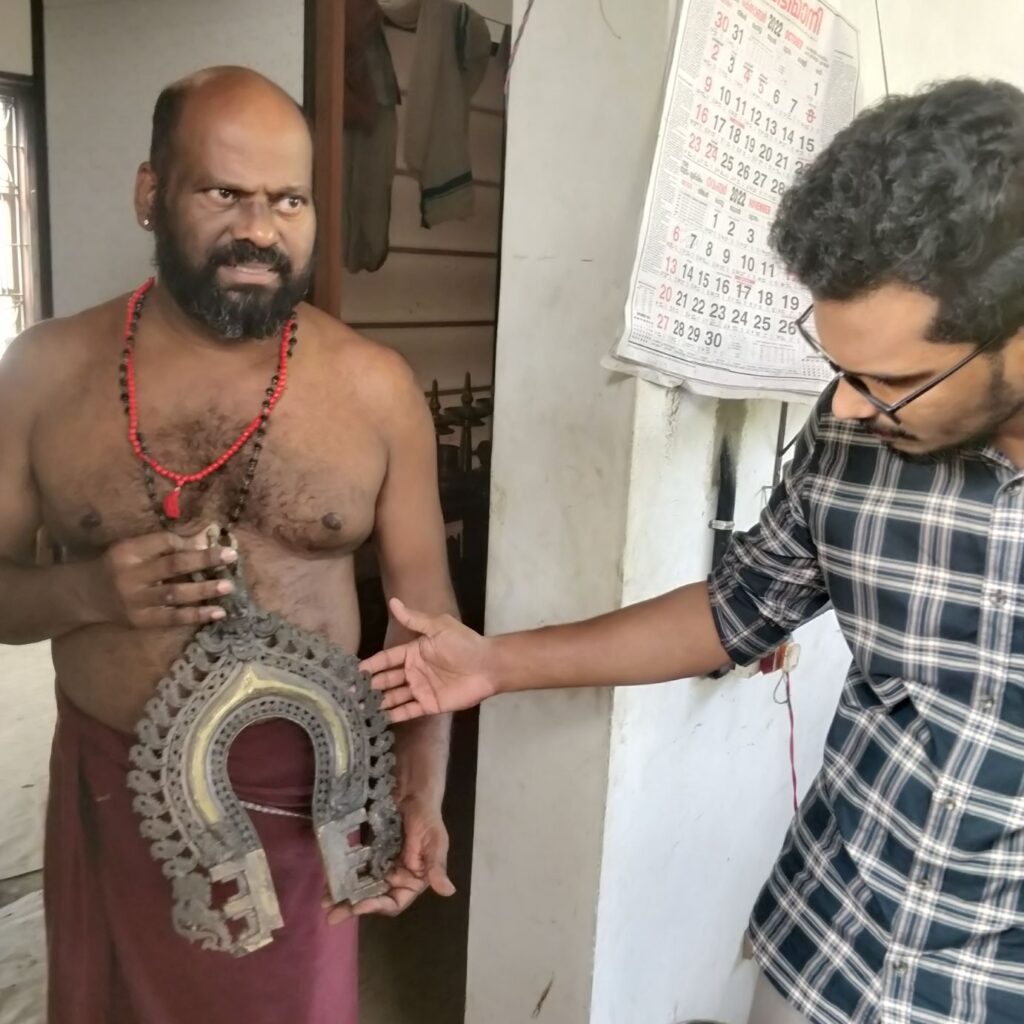
Journey into Kunhimangalam village in Kannur, and you’ll bear witness to the enchanting art of bell-metal crafting in its fullest glory, a gem in Moksha Stories’ ecotourism portfolio. Here, artisans transform raw materials into exquisite pieces that are not just utilitarian but also works of art, allowing travelers to appreciate the precision and passion they invest in their craft.
In Mannar, Alleppey, and Thrissur, you can explore other enclaves of bell-metal craftsmanship, each with its unique style and techniques, all of which are included in Moksha Stories’ ecotourism offerings.
These artisans are the torchbearers of a tradition that spans generations, their commitment to preserving this heritage a testament to Kerala’s rich cultural fabric and commitment to ecotourism.
Kathakali Koppu Masters: Crafting Aesthetic Beauty
Kerala’s world-renowned Kathakali dance form is celebrated for its graceful movements, intricate makeup, and elaborate costumes, making it a unique ecotourism attraction.
Among these costumes, the Kathakali Koppu, comprising ornamental headgears (Kireedams), wristbands (hasta ghadakam), and shoulder ornaments (thol pootu), stands as a symbol of the art form’s aesthetic finesse and meticulous attention to detail.
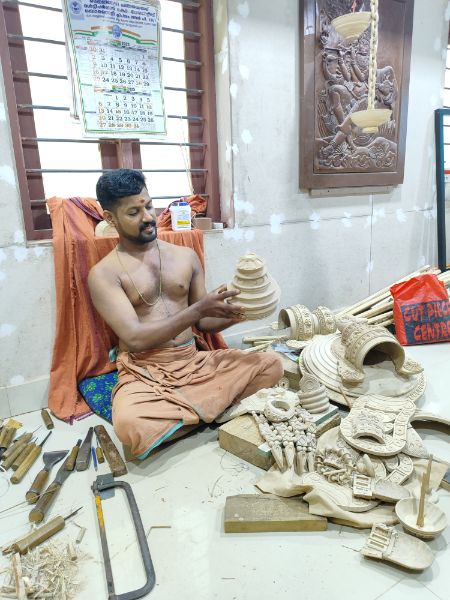
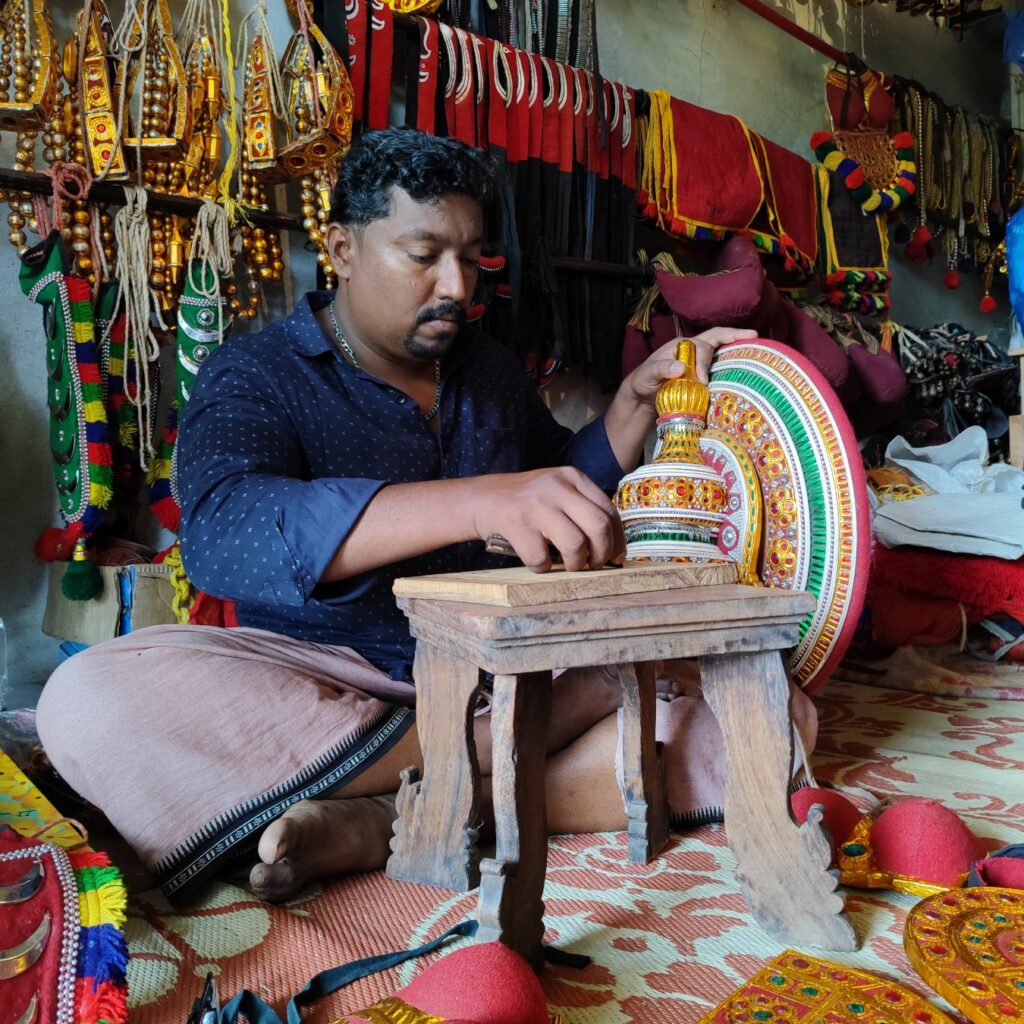
The craft of creating Kathakali Koppu is an arduous journey that demands unwavering dedication and precision. Crafting each piece can take up to 45 days, and the material of choice is the Kumil tree, also known as Gmelina arborea.
In Vellinezhi, a village in Palakkad, Kerala, most of these ornamental treasures come to life, offering ecotourism enthusiasts a unique opportunity to witness this meticulous process.
Delve into the world of Kathakali Koppu with Moksha Stories’, and you’ll witness the artistry of the Koppu masters who painstakingly carve each piece with unyielding commitment and precision.
In Vellinezhi, where most of these ornaments are painstakingly crafted, you’ll find a dedication that spans generations, dating back to the inception of Kathakali in the village.
As you journey through this realm of art and tradition with Moksha Stories’, you’ll develop a profound appreciation for the craftsmanship that goes into crafting these intricate ornaments, deepening your connection with Kathakali and enriching your understanding of this mesmerizing dance form.
Percussion Instrument Making: Crafting Melodies
Kerala’s fervour for music and dance is evident in the grand processions during the festival season, featuring renowned ensembles like Panchavadhyam and Melams, offering a unique musical experience.
At the heart of these ensembles lie leather-based percussion instruments like timila, chenda, maddalam, edakka, mridangam, tabla, and more. These instruments are meticulously crafted by expert artisans, reflecting exceptional skill and artistry, and are an integral part of Moksha Stories’ ecotourism offerings.

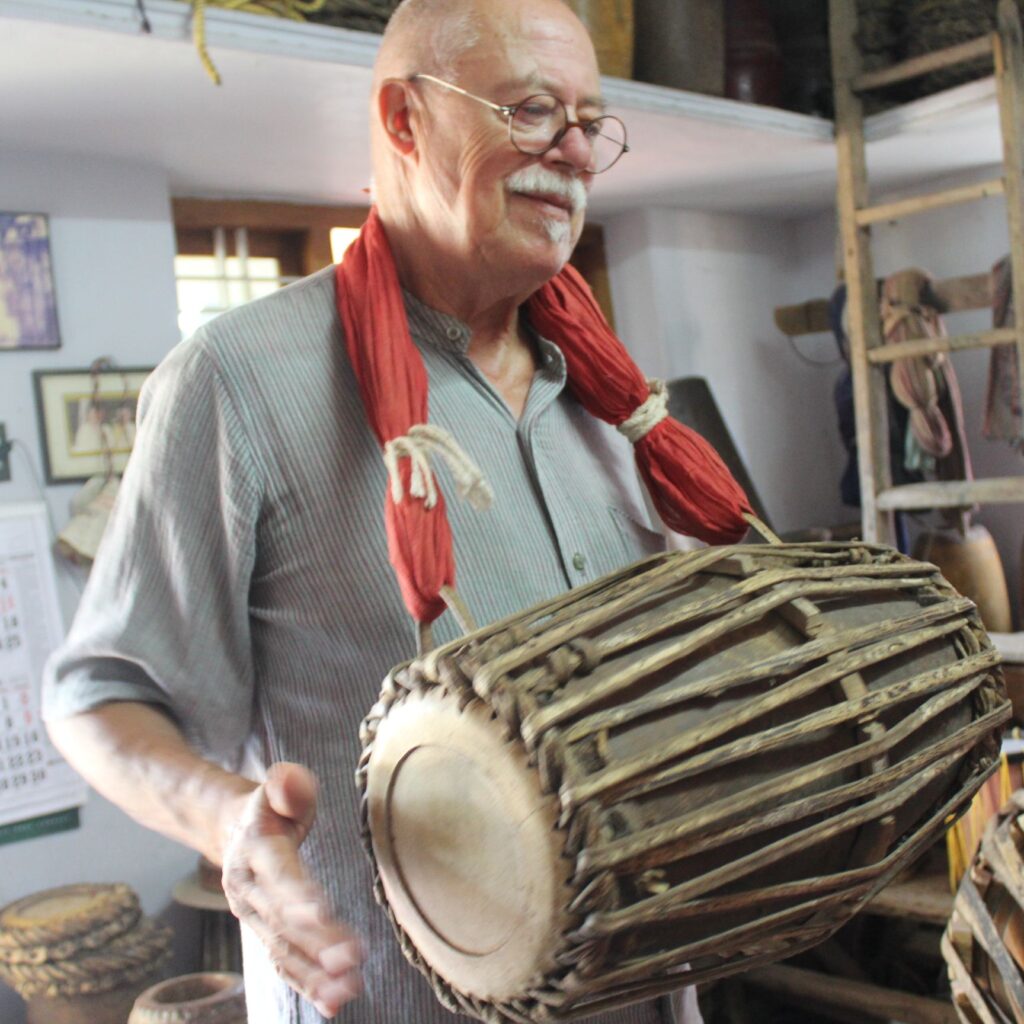
Most of these percussion instruments are fashioned from animal skins such as buffalo and goat, with the instrument’s trunk crafted from the resilient jackwood trees. In Peruvemba village in Palakkad, Kerala, you can witness the birth of these traditional drums, some of which have earned the prestigious Geographical Indications tag, making it a significant part of Moksha Stories’ ecotourism portfolio.
The community in this village has been crafting these traditional drums for over two centuries, providing a deep-rooted experience.
The crafting process for these instruments is a symphony of talent and creativity. It commences with the painstaking processing of animal skins, followed by meticulous sun-drying. The artisans then fortify the skins and carefully temper them.
Simultaneously, they sculpt the trunk that forms the instrument’s base. Ultimately, the dried skin is cut and affixed to the drum’s ends. It takes approximately two months for a skilled craftsman to complete a single instrument.
In Peruvemba village, around 75 families partake in crafting these percussion drums, a testament to the community’s commitment to preserving tradition.
As you bear witness to this process with Moksha Stories’ ecotourism experiences, you’ll not only marvel at the artisans’ skill and artistry but also gain a profound understanding of the indispensable role these instruments play in Kerala’s vibrant cultural celebrations.
Killimangalam Paaya: Crafting Sustainability
Killimangalam, a serene village nestled in the Thrissur district of Kerala, is renowned for a remarkable ecotourism experience known as Killimangalam Paaya, or traditional straw mats.
These mats stand as a testament to Kerala’s commitment to sustainability, meticulously crafted using Kora grass harvested along the banks of the River Nila. This ecotourism experience showcases Kerala’s dedication to preserving tradition while embracing sustainability, a philosophy dear to Moksha Stories.
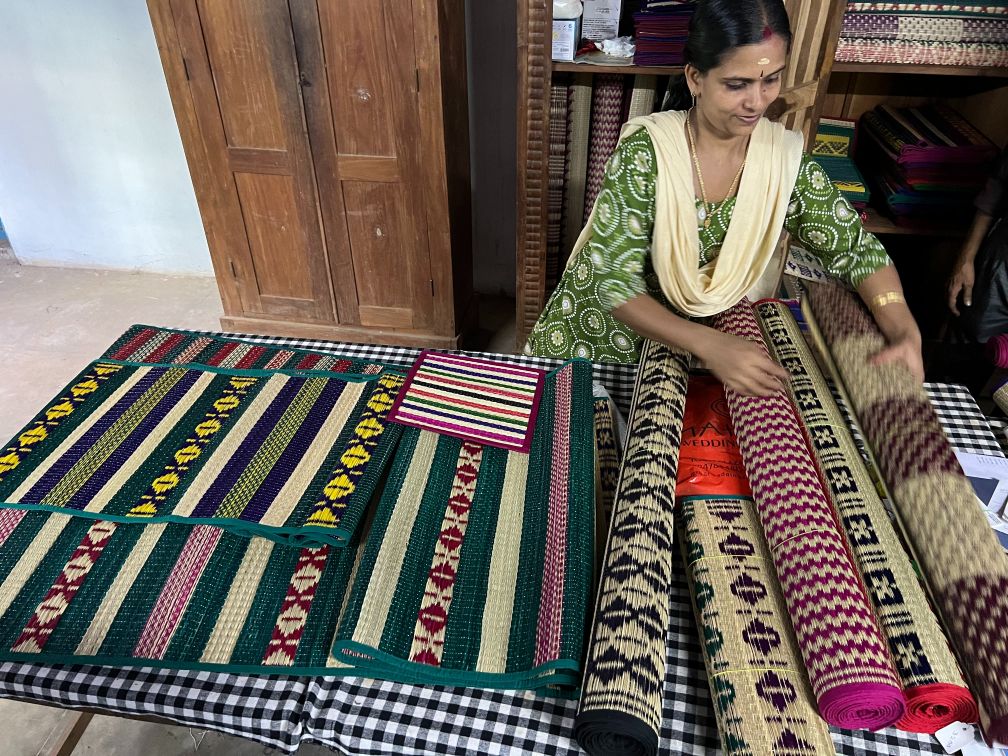

The art of fashioning Killimangalam Paaya is a labour-intensive process that forms a special community experience. The entire journey, from treating the grass to the final product, spans approximately two weeks, offering our travellers, a deep and immersive experience.
The Kuruva community, who brought this weaving tradition from Tamil Nadu as they migrated and settled along the river Nila, have been instrumental in preserving this traditional craft.
Challenges such as low wages and difficulty procuring Kora grass due to river encroachment pushed many families away from this vocation. In the 1950s, the Killimangalam Weaving Co-operative Society was established to oversee production and supply, showcasing the commitment to upheave this craft.
Presently, the majority of the society’s members are women, proudly carrying forward this tradition in the spirit like never before.
In 2006, UNESCO recognized the excellence of the Killimangalam Weaving Co-operative Society with a seal of approval for their unique design, known as Pallakuzhi Paaya.
The intricate patterns and sustainable practices of these mats render them not only functional but also environmentally conscious.
Epilogue
In summation, Kerala’s community-based ecotourism experiences weave together a captivating tapestry of vibrant hues, deep-rooted history, and diverse traditions.
With an unswerving commitment to excellence, Moksha Stories extends a sincere invitation to not merely visit, but to immerse yourself in these extraordinary encounters. Let yourself be transported to a realm of enchantment and wonder through the unparalleled lens of these experiences.
As you embark on this remarkable journey through the heart of Kerala with Moksha Stories’, you will be privy to the very essence of its culture and heritage. These unique interactions will not only enrich your voyage but also instil within you a profound reverence for the age-old traditions and masterful craftsmanship that define this remarkable region.
Kerala transcends being a mere destination; it beckons you to partake in an immersive cultural odyssey, one that awaits your exploration with Moksha Stories’ travel experiences.
Seize the opportunity to embark on these extraordinary experiences. We urge you to delve deeper, to uncover the secrets of this enchanting land, and to savor the richness of its heritage.
![logocolor[1]](https://mokshastories.com/wp-content/uploads/2023/06/logocolor1.png)

2 Responses
This blog is a gem for people who want to know more about the different community experiences of Kerala. I knew as a wonderful destination, Kerala always had many community experiences to offer. The list mentioned here is pretty new. I have been to the bell-metal makers of Kannur already. What an experience it was. I am going to pin this to my wish board. Thank you so much!!!
Thank you so much Emma. We are glad that you found our blog helpful!!!